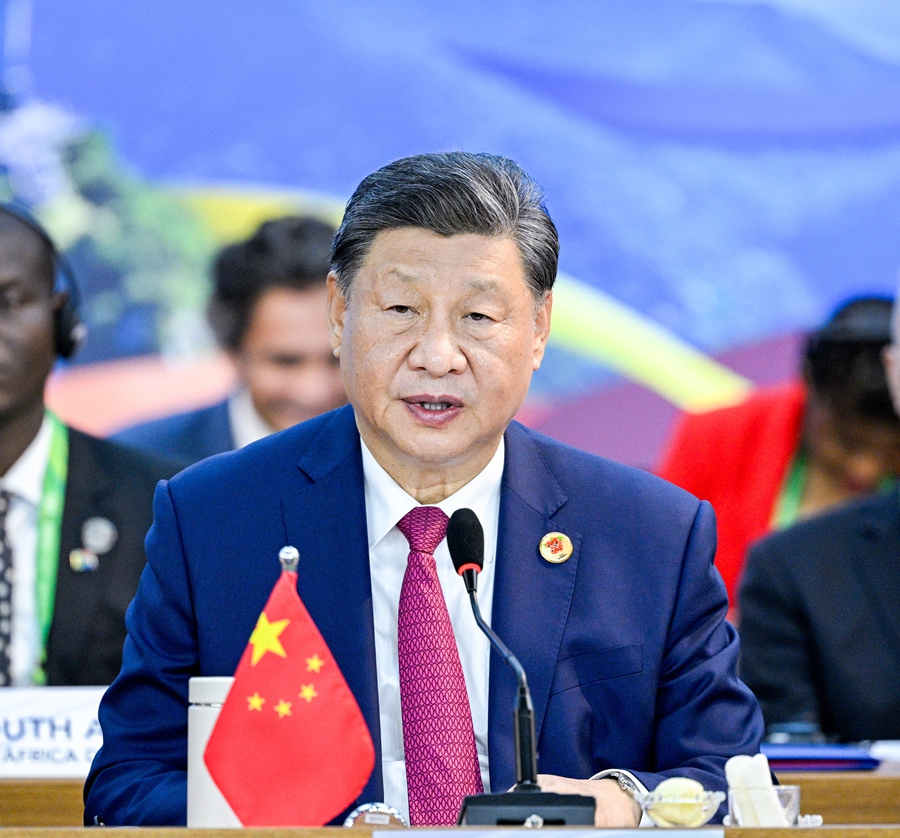G20 – Chinese social-imperialism on the march
Written by: Nick G. on 21 November 2024
(Above: Xi Jinping addresses the G20 in Brazil. Photo: Xinhua)
Chinese President Xi Jinping's remarks at the 19th G20 Summit in Rio de Janeiro, Brazil, where he called for building a fair and equitable global governance system and outlined China's eight actions for global development, outflanked rival US imperialism, currently floundering between the final days of the Biden administration and the aggressive protectionism promised by incoming President Trump.
The soft diplomacy and honeyed words from the Chinese President hark back to the days when under Khrushchev’s phoney “communism”, the world was promised “peaceful coexistence”. Khrushchev’s “peaceful coexistence” assumed that imperialism, and US imperialism in particular, would give up their butcher’s knives and turn into Buddhas just because the Soviet Union was now promising to peacefully accommodate their demands by ceasing support for national liberation and other revolutionary struggles.
Lenin and Stalin correctly saw peaceful coexistence between countries with different social systems as desirable and necessary for the Soviet Union’s peaceful construction of socialism. But they had no illusions about the inevitability of wars so long as imperialism existed, and placed, alongside their policy of peaceful coexistence, their internationalist duty to support revolutionary struggle.
“Soviet Russia,” said Lenin, “considers it her greatest pride to help the workers of the whole world in their difficult struggle for the overthrow of capitalism.”
Xi Jinping said nothing about the dangers of imperialism from his G20 platform.
"We should keep in mind that mankind lives in a community with a shared future, see each other's development as opportunities rather than challenges, and view each other as partners rather than rivals," he said.
He fed the illusion that imperialist rivalry could somehow benefit humanity, asking US imperialism to work with his own Chinese social-imperialism to “promote an equal and orderly multipolar world and a universally beneficial and inclusive economic globalization."
Fighting hunger and poverty has become a priority issue at this year's G20 Summit in Rio de Janeiro, with the first session of the G20 Summit focusing on the issue and a Global Alliance Against Hunger and Poverty launched, with China having decided to join as a key participant.
Sometimes praised for lifting hundreds of millions of its own people out of poverty, Chinese social-imperialism portrays itself as a champion of global poverty alleviation through its “partnerships” with countries of the Global South.
But China exports capital for the same reason as the US and other imperialist countries: to capture sources of raw materials and to extract surplus-value from the labour-power of workers in countries made dependent on Chinese capital.
China itself is a negative example of capitalist “poverty alleviation”. In Chairman Mao’s time, advancing along the socialist road, it was one of the world’s most egalitarian and least socially polarised countries.
China is a wealthier country today than it was at any time during the era of Chairman Mao. The capitalist mode of production, however, ensures the unequal distribution of that wealth. The social relations of China, the great gaps that socialism was successfully reducing, have deteriorated as the material wealth has increased. Capitalist methods in China have resulted in a faster elimination of absolute poverty, but at the cost of entrenching massive relative inequality and a new class structure.
China’s contribution to “global poverty alleviation” will impose the same development pattern of wealth for a few and a widening of the gap between the lucky few and the mass of the people.
It is regrettable that in our country, the same sort of people who fell for Khrushchev’s phoney communism and “peaceful coexistence” have also fallen for “socialism with Chinese characteristics” and “stability through multipolarity”.
In the absence of a clearly proletarian class outlook, and without a conscious struggle to understand and repudiate revisionism, the illusions spread by Xi Jinping fall on fertile ground.
Print Version - new window Email article
-----
Go back
Articles
| Celebrate the 80th anniversary of the defeat of fascism |
| Farm ownership in Australia |
| Quadrant: Keith Windschuttle and Australian culture wars |
| Power to the People |
| Australia Communist Autumn 2025 |
| ALBANESE DEFINES LABOR PARTY - "MAINSTREAM" and "REFORMIST NOT REVOLUTIONARY" |
| May Day Greetings from CPA (M-L) |
| May Day 2025 |
| ICOR: 1 May 2025: All over the world, come out on our day – long live socialism! |
| PROLETARIAN AND INTERNATIONALIST MAY DAY - Statement by Marxist-Leninist-Maoist Parties |
| NSW construction workers to march on May 1 |
| On May Day we celebrate First Peoples’ revolutionary potential |
| The challenge of environmentalism in modern Australia |
| US economy is not shipshape! It’s shipless! |
| US trade war with China accelerates US imperialism's decline |
| Exercise Cope Thunder 2025 and declining US regional influence |
| The Not-So Curious Incident of Low Wages Growth - Peetz report |
| No weapons for Outer Space |
| Will US blackmail us over AUKUS? |
| Fleurieu Peninsula marine deaths a sign of global warming’s existential dangers |
-----

